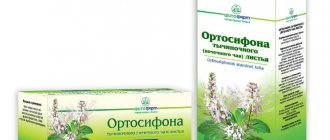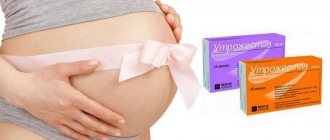A decrease in immunity is a natural phenomenon during pregnancy, as nature protects the fetus from rejection by the mother’s body. But at the same time, a woman becomes more vulnerable to pathogens. To treat and prevent infection with ARVI, Aflubin can be prescribed during pregnancy. Let's figure out what kind of drug this is and whether it is safe for the unborn baby.
Doctors advise expectant mothers to take care during the cold season: do not attend mass events, avoid hypothermia, use medical masks, etc.
However, even if you actively use preventive measures, it is not always possible to avoid infection. How to treat a cold in a pregnant woman, since most medications are contraindicated at this time? One of the drugs that is often prescribed to expectant mothers is Aflubin.
Aflubin at: information about the drug
Aflubin is a complex homeopathic remedy intended for the treatment of influenza and colds, as well as for the prevention of these diseases. It contains herbal extracts of bryonia dioica, yellow gentian, and aconite. To enhance the medicinal effect, lactic acid with iron phosphate is added to the composition.
Since the drug is produced in two forms (drops and pills), the additional substances in the composition differ. The drops contain alcohol, and the tablets contain lactose instead of alcohol.
Important! The liquid form of the drug contains 43% ethanol, so it is advisable to replace Aflubin drops with a tablet form during pregnancy.
The use of Aflubin for the treatment of acute respiratory infections can reduce the symptoms of the disease: chills, fever, weakness, muscle pain, migraine. The drug helps relieve inflammation of the respiratory tract, stopping cough and rhinitis. By strengthening the body's protective functions, Aflubin allows you to quickly defeat the disease and prevent complications, especially after the flu.
Aflubin is also prescribed as a prophylactic during the season of viral diseases. It increases local immunity of the respiratory system, which significantly reduces the risk of infection with the influenza virus.
The plant components of the drug stimulate the production of interferon. This allows Aflubin to be prescribed at all stages of the disease in order to stop the infectious process.
Aflubin has an anti-inflammatory effect on the mucous membranes, which reduces swelling, lacrimation and the release of exudate from the ENT organs. In addition, Aflubin exhibits antipyretic, antiviral and detoxification effects.
Composition and properties of aerosol, spray
- antiseptic;
- anti-inflammatory;
- pain reliever;
- bactericidal.
Ingalipt contains the following components:
- sodium sulfathiazole;
- sodium sulfonamide;
- eucalyptus oil;
- peppermint oil;
- thymol.
Streptocide and sulfathiazole have an antimicrobial effect, act quickly and are effective in treating colds. When sprayed, the medicine reaches the inflamed areas of the mucous membrane.
Thymol, mint and eucalyptus oils have antifungal, antimicrobial, anti-inflammatory, and anesthetic properties.
These components allow you to quickly relieve inflammation and pain in the throat and prevent the development of complications. During pregnancy, the spray not only quickly eliminates unpleasant symptoms, but also fights the causes of throat diseases.
The medicine can be purchased in the following variations:
- Inhalipt forte. In addition to the classic components of the spray, the drug contains sage leaf extract, which has an expectorant, astringent and disinfectant effect;
- Inhalipt forte with chamomile. The combined composition has a detrimental effect even on resistant strains of bacteria, due to which it has a wide range of applications;
- Inhalipt N - instead of sodium sulfathiazole, the composition contains the sulfanilamide substance norsulfazole.
Ingalipt Vialine spray, Ingalipt Health forte and others are also known.
Effective antiseptic
Is it possible to use Aflubin during pregnancy?
Aflubin is often prescribed to pregnant women because it is considered safe for the fetus. However, the instructions indicate that there is no information regarding the use of the drug during the gestational period, as well as during breastfeeding.
There is also no information about the effect of its components on the reproductive system. But given that there is no data on a negative effect on pregnancy, Aflubin is prescribed to pregnant women on an individual basis.
As a rule, in the early stages of pregnancy, obstetricians and gynecologists try not to prescribe any medications. Therefore, the appointment of Aflubin during pregnancy is postponed until the 2nd trimester. At this stage, it no longer affects the formation of the baby.
It is especially often taken by women in regions with a poor epidemiological situation, at the first signs of ARVI, and with the development of pain in the muscles. It should be noted that Aflubin only relieves the external manifestations of the disease and helps increase immunity, but has no effect on the disease itself. Therefore, Aflubin is used only as an addition to the main treatment.
In the second half of pregnancy, muscle pain often occurs. It may be the result of an exacerbation of existing rheumatic diseases or additional stress on the musculoskeletal system. Since most painkillers are prohibited during gestation, a woman is prescribed Aflubin during pregnancy in the 3rd trimester to improve her well-being. It has a mild anti-inflammatory effect and eliminates muscle discomfort.
What kind of drug is this
Aflubin is a homeopathic medicine that is used to treat and prevent influenza and other respiratory infections. The medicine has a direct antiviral effect, promotes the synthesis of interferon and has an anti-inflammatory effect. Another advantage is that Aflubin according to the instructions is not contraindicated during pregnancy.
The drug is available in the form of tablets and alcohol solution.
The medicine is used for the following diseases:
- ARVI.
- Infection with influenza and parainfluenza viruses.
- Other types of respiratory infection.
- Prevention of seasonal ARVI.
- Joint pain syndrome in rheumatism.
Aflubin has no contraindications and is approved for use in the first trimester of pregnancy. The action of the drug is aimed at activating the body’s own forces, increasing the synthesis of interferon, which protects the mucous membranes of the mouth, nose and tracheobronchial tree from pathogenic microflora.
In addition, Aflubin activates the body's nonspecific defenses, which has a positive effect on the course of the disease: there is a decrease in fever, a decrease in signs of intoxication, headaches and body aches. The drug is indicated not only for viral infections of the ENT organs, but also as an addition to the main treatment for joint diseases - rheumatism, arthritis, arthrosis, osteochondrosis, ankylosing spondylitis.
Aflubin: instructions during pregnancy
Self-administration of Aflubin during gestation is undesirable. Although the drug is well tolerated and has no strict contraindications, it is difficult to predict how the body of a pregnant woman will react to it. Therefore, only a doctor should prescribe Aflubin if there are indications for it.
Indications and contraindications for the use of Aflubin during pregnancy
The results of a study of Aflubin as a prophylactic agent during the acute respiratory infection epidemic, which was carried out by employees of the Moscow Health Committee, were as follows:
- A prophylactic course of Aflubin reduces the incidence of acute respiratory infections by half.
- With timely treatment at the first stage of influenza development, Aflubin has an immunomodulatory effect, which prevents the occurrence of obstruction of the respiratory system and the prescription of antibiotic therapy.
- The drug is hypoallergenic, it is well tolerated at any age, and does not affect the gastrointestinal tract.
- During the study, it was noted that Aflubin is effective against such forms of the virus as adenovirus and rhinovirus infection, influenza types A, B, C, parainfluenza, coranovirus, and respiratory syncytial infection.
The official indications for the use of Aflubin are: prevention and treatment of viral infections, influenza, inflammatory and rheumatoid diseases accompanied by pain in muscle tissue.
The drug has no contraindications, but if individual intolerance to its composition develops, Aflubin is not prescribed.
Dosage and duration of treatment with Aflubin during pregnancy
The dosage of Aflubin during pregnancy is selected by the attending physician. If his recommendations are absent, treatment is carried out according to the regimen specified in the annotation for the drug.
Dosage of Aflubin drops as part of complex treatment of influenza:
- the first 2 days - 10 drops every 60 minutes, but no more than 8 times per knock;
- the next 3-7 days (or until complete recovery) - 10 drops three times a day;
- for planned prevention, Aflubin should be taken 30 days before the predicted epidemic. Take 10 drops twice a day for at least three weeks;
- for emergency prevention, for example, after contact with a virus carrier, it is recommended to take 10 drops 2 times a day. Treatment is carried out on average for three days.
To achieve the maximum therapeutic effect, drops should be taken between meals, observing an interval of 30 minutes before or 60 minutes after a meal. It is advisable to keep the drug in the mouth for some time and then swallow it. It is allowed to dilute the drops in a spoon of water.
Method of use of Aflubin tablets:
- the first two days - 1 tablet 4 times a day; if your health does not improve, treatment at this dose is added for another two days;
- the next 3-7 days - 1 tablet in the morning and before bed;
- Influenza prevention is carried out as planned, after contact with a patient, or after a provoking factor (hypothermia, being in a crowded place). Take 1 tablet twice a day for up to three weeks.
Side effects and overdose of Aflubin in pregnant women
Since the concentration of herbal extracts in the drug is low, the risk of developing negative reactions is minimal. In rare cases, women may develop individual intolerance in the form of:
- active salivation;
- allergic reaction;
- nausea.
These symptoms pass quickly and do not affect the health of the woman and baby.
Important! Data on an overdose of the drug Aflubin have not yet been recorded.
Aflubin during pregnancy - special instructions
- Despite the lack of data on the negative effect of the drug on the fetus, treatment with Aflubin drops during pregnancy (1st trimester) is undesirable, since the formation of fetal organs can be affected not only by medicinal plants, but also by ethanol. Therefore, it is preferable to postpone taking the drug until the second trimester or replace it with Aflubin tablets.
- Although the drug is not only an immunomodulatory, but also an antiviral agent, it does not have the same effect as the flu vaccine. Therefore, in severe epidemiological situations, it is advisable to be vaccinated against the strain of influenza virus circulating in the air.
- At first, after starting to take Aflubin, existing signs of a cold may intensify (primary reaction). After a few days, this reaction goes away and relief comes. If the pregnant woman’s well-being does not change for the better, the doctor considers alternative treatment options and cancels Aflubin.
- Patients with liver disease, with an increased risk of developing an epileptic attack, or with alcohol dependence should not take Aflubin in the form of drops. This is due to the presence of alcohol in this form of the drug.
- Taking Aflubin drops, despite the presence of alcohol, does not affect the ability to drive a vehicle and does not reduce a woman’s ability to work.
- It is prohibited to combine Aflubin with the use of other immunomodulators, so as not to affect the ongoing pregnancy and not cause complex adverse reactions.
- If long-term treatment with Aflubin is carried out, the woman should be under the supervision of an experienced homeopath due to the risk of side effects not described in the instructions.
Folk remedies and methods of prevention
To prevent colds and increase pain in a pregnant woman, it is enough to follow simple recommendations.
- During the period of exacerbation of viral diseases, when going outside, wear a medical mask, avoid moving around the city on public transport and places with large crowds of people.
- Carry out wet cleaning regularly, ventilate the room regardless of weather conditions, observe the temperature in the apartment and the air humidity level.
- Upon returning home, to prevent the proliferation of viruses and bacteria, rinse your sinuses and mouth with herbal decoctions. Suitable for these purposes are: decoctions of coltsfoot, willowherb leaves, and thyme. To prepare the infusion 2 tbsp. spoons of dry leaves are poured with boiling water and left for an hour in a warm place, after which they are used for their intended purpose. Rinsing is carried out 2-3 times a day.
- A pregnant woman is prohibited from lifting any weights or engaging in complex sports. Failure to follow these recommendations can cause not only pain, but also endanger the life of the mother and fetus.
- When a pregnant woman's temperature rises above subfebrile levels, the safest and simplest remedy is Paracetamol. It is also recommended to drink more fluids to speed up the process of reducing the temperature to normal levels.
In conclusion, it can be noted that Ibuklin is a modern and effective drug that can be used in the 2nd trimester of pregnancy. But this should be done only after consulting a doctor, strictly observing the dosage prescribed by him.
Remember that the best remedy for any diseases of various etiologies during pregnancy is their prevention or timely consultation with a doctor and compliance with treatment recommendations.
Effective analogues of Aflubin during pregnancy
In addition to Aflubin, there are many antiviral drugs that can enhance immunity and are allowed during gestation. There is no exact analogue of Aflubin, but the most well-known drugs with a similar therapeutic effect are: Anaferon, Kagocel, Influcid.
- Anaferon is an immunomodulator that stimulates endogenous interferon and also reduces the number of viruses in affected tissues. During pregnancy, it is prescribed with caution, since there is no information yet on the effect of Anaferon on the fetus. The drug is contraindicated in the first trimester. Causes itching, problems with the swallowing reflex, swelling.
- Kagocel - effectively suppresses the activity of viruses and improves immunity. It is not advisable to take it during the gestational period, but if the benefit of treatment outweighs the risk to the fetus, Kagocel is prescribed in the second and third trimester. May cause allergic reactions.
- Influcid is a safe homeopathic remedy without side effects or contraindications. During pregnancy, it is prescribed at the discretion of the doctor.
Pros and cons of Inhalipt
The positive aspects of use include local action. The active components come into contact only with the mucous membrane of the oral cavity and enter the blood in minimal quantities, so the negative impact on the fetus and the gestation process is insignificant.
The drug is generally well tolerated
The arguments of opponents of the drug are as follows:
- thymol and sulfonamides are strictly prohibited due to their toxic effect on the fetus. Studies on rats have confirmed this;
- the drug contains ethyl alcohol, which is prohibited in the first, second and third trimesters;
- Eucalyptus and peppermint essential oils are known to cause allergic reactions. It is better to refrain from using it for women prone to allergic reactions;
- due to substances that affect the nerve receptors of the oral cavity, the drug can cause nausea and vomiting in the 1st trimester.
Aflubin during pregnancy - reviews
It is impossible to find a clear answer to the question whether pregnant women are allowed to take Aflubin in the instructions. The manufacturers of the drug limited themselves to the recommendation to carry out treatment according to the doctor’s recommendations. Therefore, there are many supporters of this drug and opponents. And their opinions regarding taking Aflubin during gestation are, of course, completely opposite.
Some women positively perceive taking Aflubin to prevent influenza, which is very dangerous for the unborn baby. They believe that a homeopathic remedy with a small amount of medicinal herbs cannot harm the fetus, since it is prescribed even to infants. In addition, they are quite satisfied with the result after treatment and the complete absence of adverse reactions.
Most of the responses from women contain information about the high effectiveness of Aflubin, which helped avoid infection with the flu, and for those who managed to get sick, it accelerated recovery without any complications. There is also not a single review that talks about the established fact of a negative impact on the intrauterine development of the baby.
Opponents of Aflubin rely on the fact that in-depth studies have not been conducted, so it is not possible to claim that there is no fetotoxic effect. They are especially negative about alcohol drops, since any alcohol during pregnancy can be dangerous. In addition, clear data on the effect of Aflubin on the immune system is simply impossible to obtain, since the therapeutic effect of homeopathic remedies is studied superficially.
Another unpleasant aspect of treatment with Aflubin during pregnancy is its ability to stimulate the production of interferon. And after conception, as you know, immunity is deliberately reduced so that the body does not reject the fertilized egg. Therefore, it is very difficult to predict how the immune system will behave towards the fetus after treatment.
The opinions of both sides are contradictory and not supported by research, so a woman should first listen to the opinion of her obstetrician-gynecologist. And only after comparing the risks and benefits, make a decision about the need to take Aflubin.
Adverse reactions and contraindications
The concentration of active components in a homeopathic preparation is low, and accordingly, the likelihood of developing adverse reactions is quite low. In some cases, women complain of excessive salivation. This phenomenon should not be counted as the main reason for refusing to take drugs; it does not lead to pathological changes in the body of the mother and fetus.
Contraindications include:
- Intolerance to individual components of a homeopathic remedy
- Serious disturbances in the functioning of the kidneys and liver
- Lactose intolerance (when using the drug in tablet form).
Sources
- https://beremennost.net/aflubin-pri-beremennosti
- https://mjusli.ru/ja_mama/planirovanie-beremennosti/aflubin-pri-beremennosti
- https://luxmama.ru/aflubin-pri-beremennosti
- https://zaletela.net/lekarstva/aflubin-pri-beremennosti.html
- https://beremennostnedeli.ru/zdorove/vitaminy-i-lekarstva-pri-beremennosti/aflubin-pri-beremennosti-1-trimestr.html
- https://puziko.online/mozno-li/ml-lekarstva/aflubin.html
- https://po-beremennosti.ru/instrukciya-po-primeneniyu-aflubina-pri-beremennosti
- https://lekhar.ru/lekarstva/protivoprostudnye-sredstva/aflubin-pri-beremennosti/











